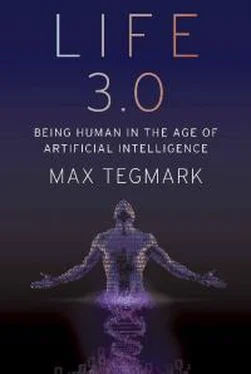When the Omegas used the Amazon cloud for their MTurk project, they were able to put all their Prometheus-created task modules into such virtual boxes in the cloud, because the MTurk input and output was so simple. But this wouldn’t work for graphics-heavy computer games, which couldn’t be boxed in because they needed full access to all the hardware of the gamer’s computer. Moreover, they didn’t want to risk that some computer-savvy user would analyze their game code, discover Pandora’s Box and decide to investigate what was inside. The breakout risk put not merely the games market off-limits for now, but also the massively lucrative market for other software, with hundreds of billions of dollars up for grabs.
The First Billions
The Omegas had narrowed their search to products that were highly valuable, purely digital (avoiding slow manufacturing) and easily understandable (for example, text or movies they knew wouldn’t pose a breakout risk). In the end, they had decided to launch a media company, starting with animated entertainment. The website, the marketing plan and the press releases had all been ready to go even before Prometheus became superintelligent—all that was missing was content.
Although Prometheus was astonishingly capable by Sunday morning, steadily raking in money from MTurk, its intellectual abilities were still rather narrow: Prometheus had been deliberately optimized to design AI systems and write software that performed rather mind-numbing MTurk tasks. It was, for example, bad at making movies—bad not for any profound reason, but for the same reason that James Cameron was bad at making movies when he was born: this is a skill that takes time to learn. Like a human child, Prometheus could learn whatever it wanted from the data it had access to. Whereas James Cameron had taken years to learn to read and write, Prometheus had gotten that taken care of on Friday, when it also found time to read all of Wikipedia and a few million books. Making movies was harder. Writing a screenplay that humans found interesting was just as hard as writing a book, requiring a detailed understanding of human society and what humans found entertaining. Turning the screenplay into a final video file required massive amounts of ray tracing of simulated actors and the complex scenes they moved through, simulated voices, the production of compelling musical soundtracks and so on. As of Sunday morning, Prometheus could watch a two-hour movie in about a minute, which included reading any book it was based on and all online reviews and ratings. The Omegas noticed that after Prometheus had binge-watched a few hundred films, it started to get quite good at predicting what sort of reviews a movie would get and how it would appeal to different audiences. Indeed, it learned to write its own movie reviews in a way they felt demonstrated real insight, commenting on everything from the plots and the acting to technical details such as lighting and camera angles. They took this to mean that when Prometheus made its own films, it would know what success meant.
The Omegas instructed Prometheus to focus on making animation at first, to avoid embarrassing questions about who the simulated actors were. On Sunday night, they capped their wild weekend by arming themselves with beer and microwave popcorn, dimming the lights and watching Prometheus’ debut movie. It was an animated fantasy-comedy in the spirit of Disney’s Frozen, and the ray tracing had been performed by boxed Prometheus-built code in the Amazon cloud, using up most of the day’s $1 million MTurk profit. As the movie began, they found it both fascinating and frightening that it had been created by a machine without human guidance. Before long, however, they were laughing at the gags and holding their breath during the dramatic moments. Some of them even teared up a bit at the emotional ending, so engrossed in this fictional reality that they forgot all about its creator.
The Omegas scheduled their website launch for Friday, giving Prometheus time to produce more content and themselves time to do the things they didn’t trust Prometheus with: buying ads and starting to recruit employees for the shell companies they’d set up during the past months. To cover their tracks, the official cover story would be that their media company (which had no public association with the Omegas) bought most of its content from independent film producers, typically high-tech startups in low-income regions. These fake suppliers were conveniently located in remote places such as Tiruchchirappalli and Yakutsk, which most curious journalists wouldn’t bother visiting. The only employees they actually hired there worked on marketing and administration, and would tell anyone who asked that their production team was in a different location and didn’t conduct interviews at the moment. To match their cover story, they chose the corporate slogan “Channeling the world’s creative talent,” and branded their company as being disruptively different by using cutting-edge technology to empower creative people, especially in the developing world.
When Friday came around and curious visitors started arriving at their site, they encountered something reminiscent of the online entertainment services Netflix and Hulu but with interesting differences. All the animated series were new ones they’d never heard of. They were rather captivating: most series consisted of forty-five-minute-long episodes with a strong plotline, each ending in a way that left you eager to find out what happened in the next episode. And they were cheaper than the competition. The first episode of each series was free, and you could watch the others for forty-nine cents each, with discounts for the whole series. Initially, there were only three series with three episodes each, but new episodes were added daily, as well as new series catering to different demographics. During the first two weeks of Prometheus, its moviemaking skills improved rapidly, in terms not only of film quality but also of better algorithms for character simulation and ray tracing, which greatly reduced the cloud-computing cost to make each new episode. As a result, the Omegas were able to roll out dozens of new series during the first month, targeting demographics from toddlers to adults, as well as to expand to all major world language markets, making their site remarkably international compared with all competitors. Some commentators were impressed by the fact that it wasn’t merely the soundtracks that were multilingual, but the videos themselves: for example, when a character spoke Italian, the mouth motions matched the Italian words, as did the characteristically Italian hand gestures. Although Prometheus was now perfectly capable of making movies with simulated actors indistinguishable from humans, the Omegas avoided this to not tip their hand. They did, however, launch many series with semi-realistic animated human characters, in genres competing with traditional live-action TV shows and movies.
Their network turned out to be quite addictive, and enjoyed spectacular viewer growth. Many fans found the characters and plots cleverer and more interesting than even Hollywood’s most expensive big-screen productions, and were delighted that they could watch them much more affordably. Buoyed by aggressive advertising (which the Omegas could afford because of their near-zero production costs), excellent media coverage and rave word-of-mouth reviews, their global revenue had mushroomed to $10 million a day within a month of launch. After two months, they had overtaken Netflix, and after three, they were raking in over $100 million a day, beginning to rival Time Warner, Disney, Comcast and Fox as one of the world’s largest media empires.
Their sensational success garnered plenty of unwanted attention, including speculation about their having strong AI, but using merely a small fraction of their revenue, the Omegas deployed a fairly successful disinformation campaign. From a glitzy new Manhattan office, their freshly hired spokespeople would elaborate on their cover stories. Plenty of humans were hired as foils, including actual screenwriters around the world to start developing new series, none of whom knew about Prometheus. The confusing international network of subcontractors made it easy for most of their employees to assume that others somewhere else were doing most of the work.
Читать дальше












